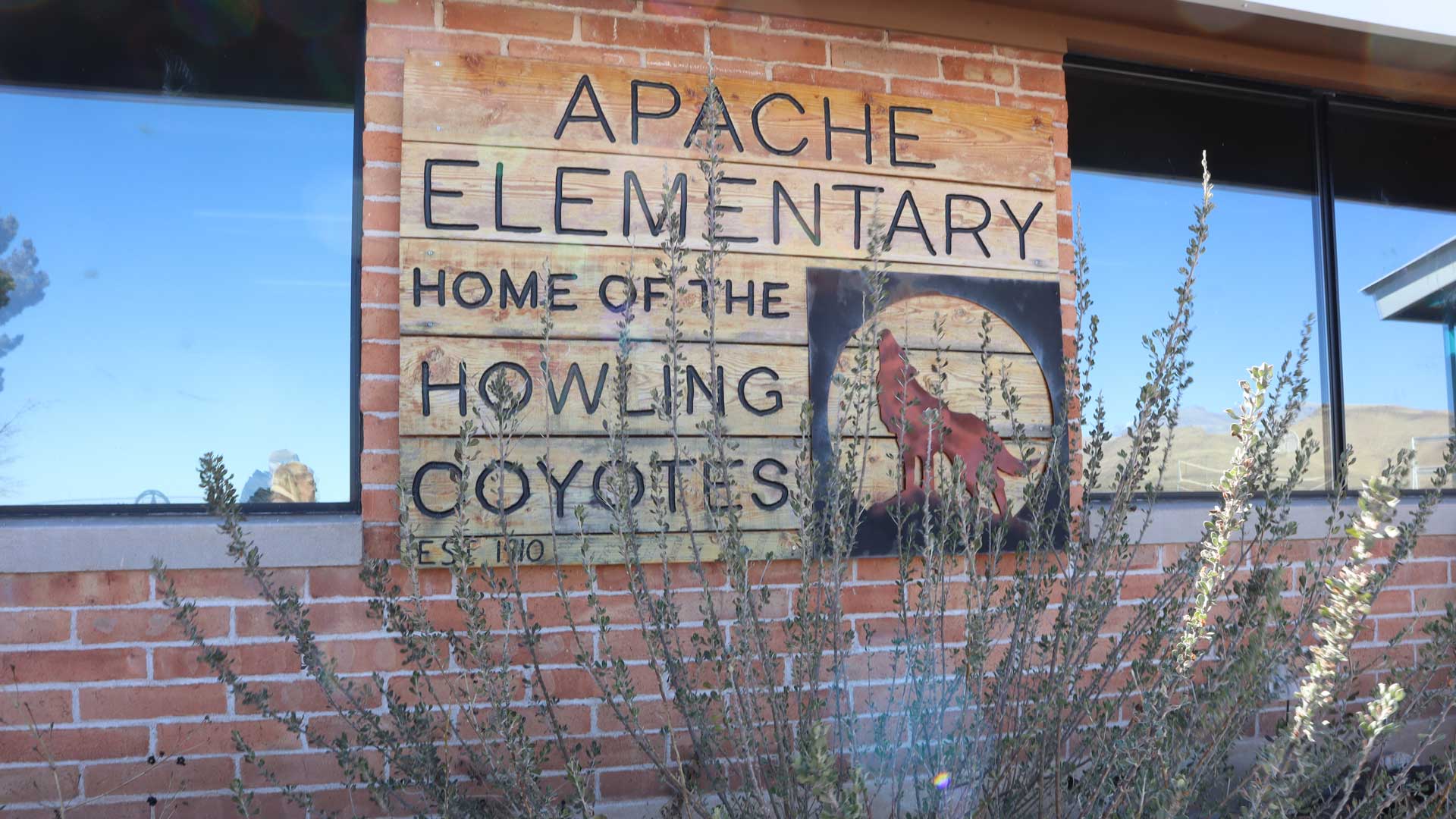 Apache Elementary School in Cochise County. March 2023
Apache Elementary School in Cochise County. March 2023
Nestled between the Peloncillo and Chiricahua Mountains, Apache Elementary School sits both as a historic and educational landmark amid the rolling hills and mountain views along one of the most rural parts of Cochise County.
The K-8 school currently has 12 students and was founded in 1904; the current building was built in the 1960s.
Loy Guzman, who is the head teacher and superintendent of Apache Elementary, said she noticed an increase in the number of migrants traveling across the area and into the school property in the last two years.
“I had unwanted people that shouldn’t be in the area come up to the teacher’s house, and they would actually turn the knob and go ‘hello, hello,’” said Guzman, who’s been teaching at the school for six years. “I’d call Border Patrol to come. We actually had one person steal some equipment from the back, and they’d came all the way up to the gate here with the equipment. And then he came into the yard for water. I’ve had people in the middle of the night in camo want me to call Border Patrol.”
Guzman said she lives on the school property and noted that communications are very limited.
“The only way that my phone works is through the WiFi at the school,” Guzman said. “There is no cell towers. So I went to the sheriff’s department and asked them about the radio. They said ‘the school district didn’t want it.’ And I said ‘no I want it,’ because we’re out in the middle of nowhere. This is like Little House on the Prairie to me.”
That’s when she met Dan Long and Jim Vlahovich, both volunteers with the Cochise County Sheriff’s Assist Team. Both men came to the school to test the radio and found that it didn’t work. So they ended up setting Guzman up with a base station radio that goes directly to dispatch.
Guzman said that because of the extra migrant traffic along the school property, she asked if Long and Vlahovich could add the school to their patrol route. Long says their weekly patrol has helped to deter the extra traffic.
“Just our presence forced — if that’s the right word — the UDAs (Undocumented Aliens) away from the school,” Long said. “And that was our goal …
“Initially we did saturation patrol where we focus mainly in the area around the school,” he continued. “We would go off the highway some and into some of the canyons — again just to make a presence. It has since morphed into a broader patrol of the Apache area where we have forged relationships with area ranchers and helped to make a presence.”
Long said that the patrol has been going on for about two years. He added that he reached out to a former colleague who suggested that the school get security cameras, and directed Long to a representative from Hanwha Vision America to see if the school could get security cameras.
He says that Hanwha donated six high-end cameras with night vision, a network recorder, and two switches to the school.
“And the ability in the software to put it online, so both the Border Patrol and the Sheriff’s Department will have live and recorded data of the school,” said Long.
AZPM reached out to Hanwha for comment, but they did not schedule a time for an interview.
Guzman said that now she has five out of the six security cameras installed.
“As for the security at the school, at night when the dogs wake me up,” said Guzman in an email. “I can now look on my phone to see what is going on out there. It has given me an added security out here.”
She said that the Border Patrol Stations from Douglas and Lordsburg usually respond, but says because the school’s remote location between two jurisdictions often results in longer response times.
Guzman said that she calls the Lordsburg Border Patrol Station as her primary contact since they are closer to Apache than the Douglas Station. But she notes that both collaborate to respond and to keep notes of what happens at the school.
“Douglas Border Patrol … They have a large area,” said Guzman. “And even the Sheriff’s Department. It would take about 40 minutes for an officer to come this way.”
“Hidalgo County, they patrol normally in Rodeo — which is about 12 miles down the road,” she continued. “But they also patrol all the way come this way and into Skeleton Canyon. So, they gave me numbers to call if I have any trouble, to call them ASAP. And they will interact with Douglas. They will tell Douglas what’s going on out here — which is a relief to me because I now have that person to contact and call.”

By submitting your comments, you hereby give AZPM the right to post your comments and potentially use them in any other form of media operated by this institution.